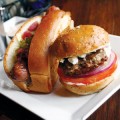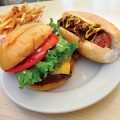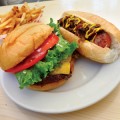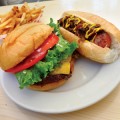There is no such thing as a cheap burger. “Cheap” and “burger” are contradictions in terms. Sure, McDonald’s or Burger King may sell 99-cent burgers, but they only cost a buck because the true cost of selling food at such low prices has been passed on to society in the form of air and water pollution, low slaughterhouse wages, corn subsidies to feed cattle and food-borne illness wrought by a food system run on the “cheap.”
In The Value of Nothing, author Raj Patel says that if all the costs associated with a Big Mac were properly added up and assessed at the cash register the true cost would be about $200.
“As an institution with a mission to return profits [McDonald’s] is keen to squeeze down what it pays for the things that go into making hamburgers, everything from beef to labor to rent to safety testing,” he writes. “The more it can drive down costs below those of its competitors, the more money it stands to make. If McDonald’s is able to cause the emission of pollutants like CO2 without having to pay for it, the costs of the firm are not the same as the broader social cost.”
So what you’re getting with a so-called cheap burger is a heaping side order of “externalities,” the term economists use to describe those costs passed on to society not accounted for at the checkout line.
When it comes to food, fast-food restaurants are the biggest culprits in the cult of cheap. That’s why it’s satisfying to see a restaurant like Palo Alto’s SliderBarCafe break from the pack and offer something different.
No, they don’t sell $200 burgers. In fact, they offer little hockeypuck-size burgers (is that where the term slider comes from?) that go for $2.79 to $4.99. What sets the restaurant apart is its choice of ingredients. Instead of lowest-common-denominator commodity meat, SliderBarCafe uses Niman Ranch beef and pork and Masami Farms Kobe-style beef.
The rest of the menu is enlightened, too. The coffee is organic, and the dairy products come from Clover Stornetta Farms, a local creamery. The soda pop (Boylan) is even enlightened, and made with cane sugar instead of high-fructose corn syrup.
Ashwani Dhawan, who owns nearby Mantra, a high-end modern Indian restaurant, opened SliderBarCafe with the help of consulting chef Bruce Bowers. Bowers has created an appealing lineup of burgers that range from a traditional cheeseburger to a spiced lamb burger and an Indian-inspired veggie burger. They’re small, so order two or three for a full meal.
The American classic slider ($2.99) hit all the right notes: juicy beef, fresh condiments and a soft but sturdy, toasted white bun. It’s pricier, but the Kobe-style beef slider ($4.29) is a good choice with its rich, beef taste and Parmesan cheese spread.
My two favorite sliders were the most nontraditional. The Mediterranean slider ($4.29) combines garlic-and-ginger-spiced ground Niman Ranch lamb with feta cheese, olives and artichokes on a multigrain bun with a mild garlic sauce. The vegetarian slider ($2.99) is a house-made patty of garbanzo beans, potatoes, sunflower seeds, onions, bell peppers and spinach on a multigrain bun. It’s quite good. The pulled-pork slider ($4.49) is a winner, too.
SliderBarCafe serves a healthier version of fries (regular, garlic and sweet potato) cooked with rice bran oil, a method that produced crispy and light fries with that side benefit of antioxidants.
SliderBarCafe opens early to serve breakfast sliders, i.e., English muffin, cage-free egg, bacon and cheese ($2.49), and it stays open until 10pm Sunday through Wednesday and until 11pm Thursday through Saturday, making the restaurant a great place to grab a few late-night burgers and a glass of wine or a beer. SliderBarCafe has a good list of wines by the glass and beer on tap.
Fast-food burgers are here to stay. But in a country that loves its burgers and the freedom of choice, SliderBarCafe offers a great alternative to the classic American meal that doesn’t come with such a hefty social cost on the side.
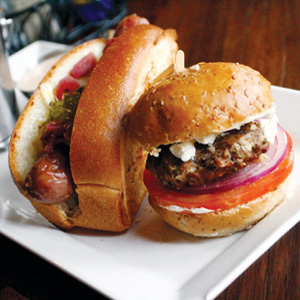
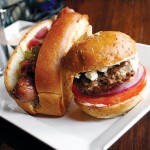 Review: SliderBarCafe
Review: SliderBarCafe 